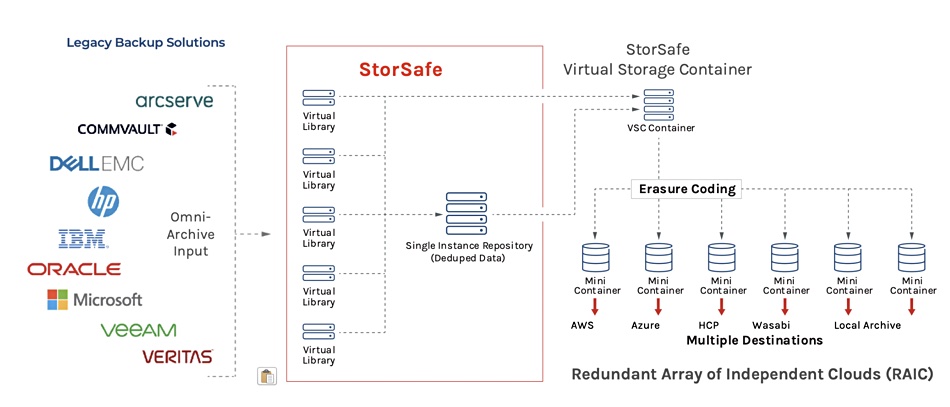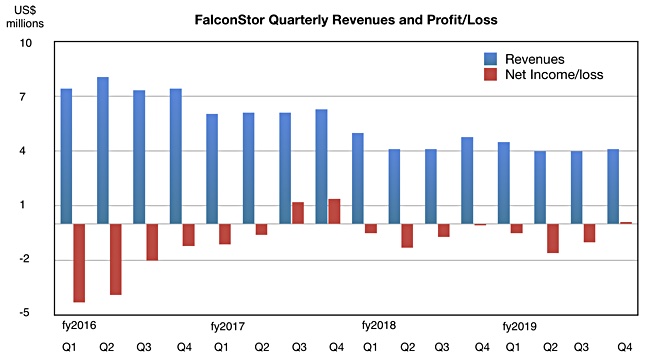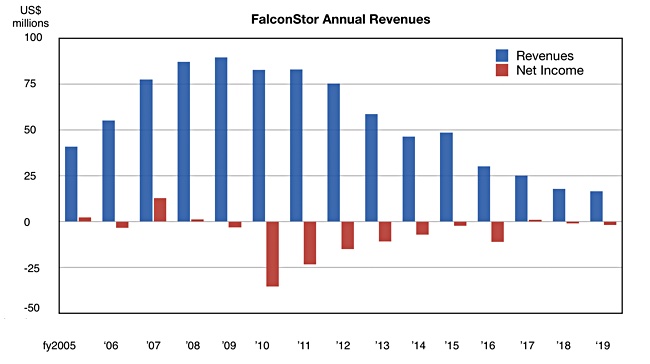FalconStor has announced StorSafe, a persistent data storage container for enterprises. The software integrates with legacy backup and archive software and processes, and is compatible with cloud- and S3 object-based storage architectures.
In effect this is a virtual container-based archive abstraction layer across the AWS, Azure, and Wasabi clouds, and also the Hitachi Content Platform and other on-premises (S3-compliant) archive stores.

StorSafe uses persistent virtual storage container (VSC) technology which enables disaggregation of the data from the system-level storage component. It features variable payload container storage – deduplication over large storage containers reduces cost and storage capacity consumption, and accelerates data reinstatement from smaller storage containers.
StorSafe archives are portable between public clouds and on-premises systems. The software uses redundant array of independent clouds (RAIC) container distribution via multi-cloud erasure coding. This is claimed to deliver more than 7 nines (99.99999 + per cent) availability, even if a cloud provider goes dark.
Falconstor’s virtual container archive idea is novel. It will be interesting to see how this small enterprise storage supplier develops the technology.
Road to recovery?
FalconStor revenues peaked in 2009. The company has travelled a rocky road since the founding CEO’s suicide in September 2011.
But last quarter there were encouraging signs and CEO Todd Brooks has more progress to report for 2019’s fourth quarter.
His release quote said: “The strategic decisions we made throughout 2019 to place additional commercial focus on our long-term archive retention and reinstatement product, within our core regions, delivered encouraging growth in those areas throughout 2019, and has created a focused and healthy foundation for continued growth in 2020.”

Revenues of $4.1m were down 14.1 per cent on last year’s $4.8m but Falconstor made a profit of $101,590 – its first profit after seven quarters of losses. The turnaround is slight – the year-ago loss was $77,058 – but it is a profit, achieved despite lower revenues.
Full year revenues were $16.5m compared to $17.8 million in 2018, and net loss was $1.75m (2018 – $906,714).

FalconStor’s said the revenue fall in Q4 2019 was due mostly to an intentional decreased commercial focus in China. Operating expenses of $3.3m were 7.1 per cent down on the $3.6m in the year-ago quarter. Cash and cash equivalents of $1.5m were lower than the $3.3m reported a year ago. And Falconstor has executed a 10:1 reverse stock split of its common stock.
On the bright side it reported total year-over-year sales growth of more than six per cent in its core regions, meaning outside China. Sales of its long-term archive retention and reinstatement product grew 38 per cent year on year.








